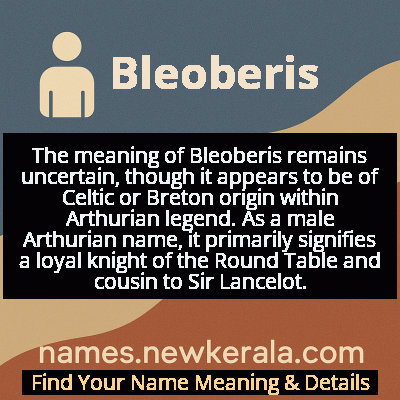Bleoberis Name Meaning & Details
Origin, Popularity, Numerology Analysis & Name Meaning of Bleoberis
Discover the origin, meaning, and cultural significance of the name BLEOBERIS. Delve into its historical roots and explore the lasting impact it has had on communities and traditions.
Name
Bleoberis
Gender
Male
Origin
Arthurian
Lucky Number
6
Meaning of the Name - Bleoberis
The meaning of Bleoberis remains uncertain, though it appears to be of Celtic or Breton origin within Arthurian legend. As a male Arthurian name, it primarily signifies a loyal knight of the Round Table and cousin to Sir Lancelot.
Bleoberis - Complete Numerology Analysis
Your Numerology Number
Based on Pythagorean Numerology System
Ruling Planet
Venus
Positive Nature
Harmonious, responsible, caring, and artistic.
Negative Traits
Overly idealistic, superficial, possessive, or jealous.
Lucky Colours
Pink, turquoise.
Lucky Days
Friday.
Lucky Stones
Diamond, turquoise.
Harmony Numbers
2, 3, 9.
Best Suited Professions
Artists, musicians, teachers, healthcare workers.
What People Like About You
Warmth, nurturing nature, artistic flair.
Famous People Named Bleoberis
Sir Bleoberis de Ganis
Arthurian Knight
Knight of the Round Table and cousin to Lancelot
Bleoberis of Brittany
Legendary Warrior
Prominent figure in Arthurian Grail quest narratives
Bleoberis the Strong
Mythical Knight
Featured in multiple medieval Arthurian texts and cycles
Name Variations & International Equivalents
Click on blue names to explore their detailed meanings. Gray names with will be available soon.
Cultural & Historical Significance
Historically, Bleoberis reflects the complex transmission of Celtic and Breton names into French and English Arthurian tradition. His consistent portrayal as a competent, loyal knight who supports more famous relatives illustrates the medieval understanding of social hierarchy and the importance of reliable vassals in feudal society. The character's endurance across centuries of Arthurian retellings shows how even secondary figures contributed to the rich tapestry of Arthurian legend, providing depth and realism to the depiction of Camelot's knightly community.
Extended Personality Analysis
Bleoberis is characterized by unwavering loyalty, martial competence, and a strong sense of duty that defines his role in Arthurian legend. As a knight who consistently appears across various texts, he demonstrates the qualities of a reliable secondary character—brave in combat, faithful to his kinship bonds, and dependable in fulfilling his knightly obligations. His personality suggests someone who values honor through consistent action rather than seeking personal glory, making him the archetype of the solid, dependable warrior who forms the backbone of any successful military organization.
This knight's psychological profile reveals a man comfortable with his position in the social hierarchy, content to support more prominent figures like Lancelot while maintaining his own dignity and competence. His consistent portrayal across Arthurian literature suggests a personality marked by stability rather than dramatic development, representing the ideal of feudal service and knightly reliability. The traits associated with Bleoberis—loyalty, competence, humility, and steadfastness—reflect medieval values that prized dependable vassals as essential to maintaining social and military structures.
Modern Usage & Popularity
In contemporary contexts, Bleoberis remains an exceptionally rare name used almost exclusively within specialized circles of Arthurian enthusiasts, historical scholars, and fantasy literature aficionados. The name has never achieved mainstream popularity and does not appear in modern baby name registries or databases, maintaining its status as a purely literary and historical reference. Its usage is primarily confined to academic discussions of Arthurian literature, character names in niche Arthurian adaptations, or among parents with particular interest in medieval mythology seeking distinctive names. The name's archaic sound and association with a relatively obscure Arthurian figure ensure it remains a curiosity rather than a trending choice, though it occasionally surfaces in fantasy gaming or historical reenactment communities where authentic Arthurian names are valued.
Symbolic & Spiritual Meanings
Symbolically, Bleoberis represents the essential but often overlooked foundation upon which great enterprises are built—the reliable supporter rather than the celebrated hero. His consistent presence in Arthurian legend as a competent but secondary knight embodies the medieval understanding that successful kingdoms and military campaigns depend on capable followers as much as charismatic leaders. The name carries connotations of feudal loyalty, martial reliability, and the quiet dignity found in faithful service. In a broader metaphorical sense, Bleoberis symbolizes the importance of secondary excellence—those individuals whose consistent competence and loyalty enable the achievements of more famous figures while maintaining their own integrity and value within the social structure.

